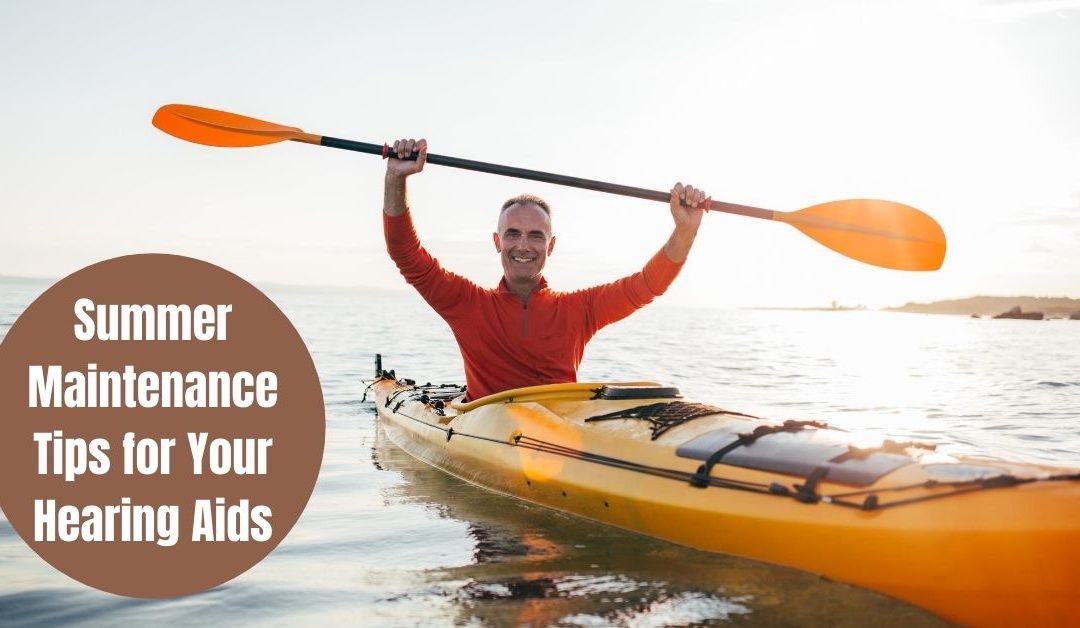If you wear hearing aids, you know how critical it is that they perform their best. Keeping your hearing aids working well and lasting a long time requires a little consideration and maintenance. While maintaining your hearing aids is straightforward and simple, summer brings with it a few extra challenges for those who use hearing aids. Alongside seasonal fun is a higher risk that your hearing aids could be damaged. Here are three big summer factors to consider when thinking about your hearing aids.
Excessive Heat
Your hearing aids are built to withstand a comfortable range of temperatures, but summer’s heat can easily create conditions that aren’t healthy for your hearing aids. Most importantly, don’t leave your hearing aids in a place with direct sun exposure, especially inside a hot car.
Unshaded vehicles trap heat in the summertime elevating their temperatures rapidly like an oven or furnace. Hot cars can sadly be deadly for pets and people and they can wreck havoc on your hearing aids. Extreme heat has the potential to melt plastic components and casings for your hearing aids, damaging their integrity, fit and performance.
Hot cars can also get to temperatures that damage a hearing aid’s battery, especially concerning if your devices rely on built in rechargeable power. Many electronic components will have their performance affected by heat exposure and allowing your hearing aids to become overheated may cause them to malfunction beyond repair.
Avoid leaving your hearing aids in heat and direct sunlight. When you remove your hearing aids, secure them in a watertight storage case and take them with you. Keep the case shaded and out of the sun.
Water
The next big summer issue for hearing aids is avoiding water. Just as you can intuit that water and household electronics don’t mix, your hearing aids aren’t built to get wet. When water infiltrates into an electronic device like a hearing aid, ions in the water can conduct electricity across separated components, potentially shorting out or damaging your hearing aid.
To withstand the moist conditions of the human ear canal, most hearing aid components are protected by a water-resistant coating which helps them withstand everyday body moisture, but this coating doesn’t make your hearing devices waterproof. Hearing aids should never get wet, especially for prolonged periods.
In the summer, it can seem like water is everywhere – the season is full of swimming, beaches, rainstorms and garden hoses. When it looks like things may get wet, your hearing aids need to get stored in a waterproof storage case. You also need to remove your hearing aids before showering and bathing, and it is a good idea to protect your hearing aids if you are outside in heavy rain.
A helpful device for regular hearing aid maintenance year-round is a hearing aid dryer. A hearing aid dryer is a small sealed case that eliminates moisture from your devices while they are not being worn. There are both electronic and non-electronic varieties of hearing aids.
Extra Debris
Summer brings people outside more often, which can lead to problems with dirt, sand and other particles infiltrating your hearing aid and causing trouble. Debris and built up grease can clog or restrict parts of your hearing aid, weakening performance. Tiny particles may be difficult to remove from your device and may require that a blocked component be replaced.
In the summer extra debris is more likely to affect your hearing aids. Always make sure your hands are clean before adjusting, removing or handling your hearing devices. Sand especially can sneak into the openings and seams of your hearing aid. Also be aware of your hearing aids when you are applying sunscreen. The best policy is to remove your hearing aids before applying sunscreen, especially when spraying it. Sunscreen can clog your hearing aid.
The best way to protect your hearing aids from debris damage is to avoid exposure and wipe them down often with a clean cloth. In the summertime, wipe down your hearing aids whenever you remove them from your ears. Also wipe them down when they are exposed to your sweat. By keeping your hearing aids clean and protected with simple maintenance, they can serve you all summer long and well into the future.
To learn more about hearing aid care and our comprehensive hearing health services, please contact us.


